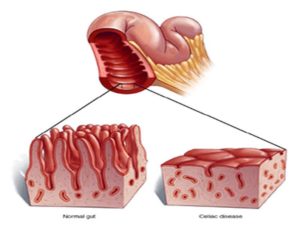Celiac disease is a digestive problem that hurts your small intestine. It stops your body from taking in nutrients from food. You may have celiac disease if you are sensitive to gluten. Gluten is a kind of protein found in wheat, rye, barley, and sometimes in small amounts in mixed oats. When you have celiac disease and you eat foods with gluten, your body has a reaction that is not normal. The part of your body that fights disease (the immune system) starts to hurt your small intestine. It attacks the tiny bumps (villi) that line your small intestine.
The villi help your body take in nutrients from food into your bloodstream. Without the villi, your small intestine can’t get enough nutrients, no matter how much food you eat.
Celiac disease is genetic. This means it can be passed down from parent to child. More than 2 million Americans have been diagnosed with celiac disease. Studies show that as many as 1 in every 133 Americans may have it. They may not know they have it.

Celiac disease is more common in people:
• Whose ancestors came from Europe
• Who are white
• Who have type 1 diabetes
• Who have Down syndrome
• Who have other autoimmune diseases
• Who are infertile
• Who have irritable bowel syndrome with diarrhea
What causes celiac disease?
Celiac disease is a genetic disease that runs in families. You may have celiac disease and not know it because you don’t have any symptoms.
Some things that may make symptoms start to appear are:
- Too much stress
- Pregnancy
- Surgery
- Physical injury
- Infection
- Childbirth
Symptoms
The signs and symptoms of celiac disease can vary greatly and differ in children and adults. Digestive signs and symptoms for adults include:
- Diarrhea
- Fatigue
- Weight loss
- Bloating and gas
- Abdominal pain
- Nausea and vomiting
- Constipation

However, more than half the adults with celiac disease have signs and symptoms unrelated to the digestive system, including:
- Anemia, usually from iron deficiency
- Loss of bone density (osteoporosis) or softening of bone (osteomalacia)
- Itchy, blistery skin rash (dermatitis herpetiformis)
- Mouth ulcers
- Headaches and fatigue
- Nervous system injury, including numbness and tingling in the feet and hands, possible problems with balance, and cognitive impairment
Risk factors
Celiac disease tends to be more common in people who have:
- A family member with celiac disease or dermatitis herpetiformis
- Type 1 diabetes
- Down syndrome or Turner syndrome
- Autoimmune thyroid disease
- Microscopic colitis (lymphocytic or collagenous colitis)
- Addison’s disease
What is the treatment for celiac disease?
If you have celiac disease, you must stop eating gluten. Eating gluten will do more damage to your small intestine. Eliminating gluten is the only treatment for this disease. You must not eat gluten for the rest of your life. In most cases, taking gluten out of your diet will stop your symptoms. And, any damage to your intestine will heal. It will also stop any more damage from happening.
Removing gluten from your diet can be difficult. This is because gluten can contaminate many foods. It can be found in condiments, salad dressings, and other unexpected places. For this reason, your healthcare provider may refer you to a dietitian who specializes in celiac disease.
After you stop eating foods with gluten, your symptoms will likely get better in a few days. Your small intestine should heal completely in 3 to 6 months. Your villi will be back and working again. If you are older, it may take up to 2 years for your body to heal.